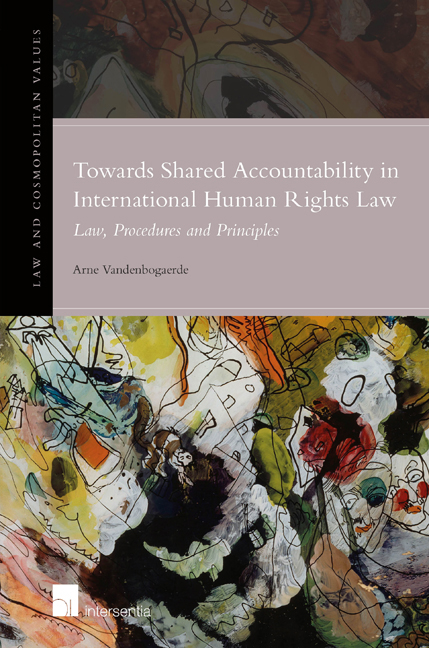Book contents
- Frontmatter
- Preface
- Acknowledgment
- Contents
- List of Abbreviations
- Chapter 1 Introduction
- PART I UNDERSTANDING ACCOUNTABILITY
- PART II ACCOUNTABILITY IN INTERNATIONAL AND REGIONAL HUMAN RIGHTS LAW: PROCESSES, PRACTICE AND LIMITS
- Chapter 3 State Reporting Procedures at the International and Regional Level
- Chapter 4 Individual, Collective and Inter-State Complaint Procedures in the International and Regional Accountability Framework
- Chapter 5 Inquiry Procedures in the International and Regional Accountability Framework
- Chapter 6 International Peer-Review Accountability Mechanisms
- Chapter 7 Special Procedures in the International and Regional Systems
- Conclusions Part II
- PART III CONTOURS OF A MULTI-DUTY BEARER FRAMEWORK
- Conclusion: Contours and Viability of A Multi-Duty-Bearer Framework
- Bibliography
- Law and Cosmopolitan Values
- Instructions to authors
Chapter 3 - State Reporting Procedures at the International and Regional Level
from PART II - ACCOUNTABILITY IN INTERNATIONAL AND REGIONAL HUMAN RIGHTS LAW: PROCESSES, PRACTICE AND LIMITS
Published online by Cambridge University Press: 13 December 2017
- Frontmatter
- Preface
- Acknowledgment
- Contents
- List of Abbreviations
- Chapter 1 Introduction
- PART I UNDERSTANDING ACCOUNTABILITY
- PART II ACCOUNTABILITY IN INTERNATIONAL AND REGIONAL HUMAN RIGHTS LAW: PROCESSES, PRACTICE AND LIMITS
- Chapter 3 State Reporting Procedures at the International and Regional Level
- Chapter 4 Individual, Collective and Inter-State Complaint Procedures in the International and Regional Accountability Framework
- Chapter 5 Inquiry Procedures in the International and Regional Accountability Framework
- Chapter 6 International Peer-Review Accountability Mechanisms
- Chapter 7 Special Procedures in the International and Regional Systems
- Conclusions Part II
- PART III CONTOURS OF A MULTI-DUTY BEARER FRAMEWORK
- Conclusion: Contours and Viability of A Multi-Duty-Bearer Framework
- Bibliography
- Law and Cosmopolitan Values
- Instructions to authors
Summary
INTRODUCTION
The first accountability relationship between the various human rights bodies and a State party to the applicable human rights treaty is the State reporting procedure. This procedure is a genuine accountability procedure as it is i) an interactive process between a power wielder (the State party) and the accountholder (the UN or regional treaty body) ii) where the power wielder is under the obligation to provide information concerning its conduct to the accountholder and iii) can face consequences if it has failed to comply with its obligations under the treaty.
In this chapter we will mainly focus on the UN's procedures (section 3.1.1), more particularly on the State reporting procedures of the CESCR and the CRC Committee. Both committees are reviewed as they have paid the most attention to extraterritorial obligations in the field of ESC rights. The state reporting procedures in the regional systems (sections 3.1.2-3.1.4) have similar characteristics and restrictions and so these will not be rehearsed extensively. State reports in the regional procedures have also not dealt significantly with extraterritorial or transnational issues. The analysis of practice (section 3.2) is thus predominantly undertaken at the level of the UN bodies.
STATE REPORTING PROCEDURES IN THE UN TREATY BODY SYSTEM
Looking at the history of the UN treaty bodies, we find that in the beginning a State reporting procedure, in particular the practice of concluding observations, did not exist. Today, this is the chief accountability procedure in the treaty system but only in the 1990s did treaty bodies start to make concluding observations on State reports. O'Flaherty indicates that ‘the treaty bodies, having sequentially commenced the practice of issuing concluding observations, tended to follow more or less the models first devised by CESCR and the HRC'. The current UN Secretary General found that a State reporting procedure is embedded in States’ obligations to respect, protect and fulfil the rights set out in the treaties. This means that States that have ratified a (human rights) treaty are made accountable to the other State parties to that treaty. This recognition is also reflected in the inter-State complaint procedure (see infra, section 4.7).
- Type
- Chapter
- Information
- Towards Shared Accountability in International Human Rights LawLaw, Procedures and Principles, pp. 47 - 88Publisher: IntersentiaPrint publication year: 2016

